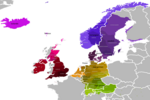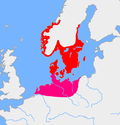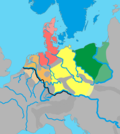 | North Sea Germanic (redirect from Ingvaeonic languages) Germanic, also known as Ingvaeonic (/ˌɪŋviːˈɒnɪk/ ING-vee-ON-ik), is a postulated grouping of the northern West Germanic languages that consists of Old Frisian... 10 KB (1,100 words) - 09:07, 9 April 2024 |
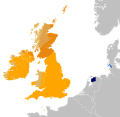 | Germanic languages. The Anglo-Frisian languages are distinct from other West Germanic languages due to several sound changes: besides the Ingvaeonic nasal... 24 KB (1,613 words) - 22:35, 4 April 2024 |
History of English (redirect from History of the English Language) English is a West Germanic language that originated from Ingvaeonic languages brought to Britain in the mid-5th to 7th centuries AD by Anglo-Saxon migrants... 63 KB (6,034 words) - 03:54, 10 April 2024 |
Syncretism (linguistics) (category Articles containing German-language text) pronunciation, that is -/z/,, -/ɪz/, and -/s/. In the Ingvaeonic languages, a subgroup of the West Germanic languages, an important case of syncretism developed... 15 KB (1,765 words) - 20:20, 12 November 2023 |
 | Germanic) Ingvaeonic languages Irminonic languages Istvaeonic languages North Germanic languages West Germanic languages Balto-Slavic languages Wolfram... 9 KB (917 words) - 00:43, 25 February 2024 |
 | Low German (redirect from Low Saxon languages) North Sea Germanic or Ingvaeonic languages. However, most exclude Low German from the group often called Anglo-Frisian languages because some distinctive... 133 KB (10,998 words) - 16:31, 10 April 2024 |
Frisians (category CS1 German-language sources (de)) Friso-Saxon dialects East Frisian Low Saxon Gronings Stellingwarfs Ingvaeonic languages List of Frisians List of Germanic tribes Number is the number of... 26 KB (2,498 words) - 18:01, 12 March 2024 |
Stratum (linguistics) (redirect from Substrates in Indo-European languages) Roman Empire giving rise to Romance languages outside Italy, displacing Gaulish and many other Indo-European languages). The superstratum case refers to... 31 KB (2,944 words) - 15:12, 13 April 2024 |
this period affected the Ingvaeonic languages, but not the more southerly Central and Upper German languages. The Ingvaeonic group was probably never... 75 KB (8,221 words) - 13:10, 7 April 2024 |
 | a bargain by joining hands"; there are also comparanda from the Ingvaeonic languages: Old Frisian hondfestinge and Middle Low German hantvestinge. The... 23 KB (2,841 words) - 06:13, 9 April 2024 |
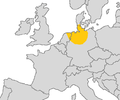 | Old Saxon (redirect from Old Saxon language) Anglo-Frisian's (Old Frisian, Old English) Ingvaeonic nasal spirant law which sets it apart from Low Franconian and Irminonic languages, such as Dutch, Luxembourgish... 28 KB (2,216 words) - 11:32, 27 March 2024 |
 | varieties of the time are generally split into three dialect groups: Ingvaeonic (North Sea Germanic), Istvaeonic (Weser–Rhine Germanic) and Irminonic... 59 KB (4,842 words) - 13:09, 18 April 2024 |
Old English (redirect from Anglo-Saxon language) Scots in Scotland. Old English developed from a set of Anglo-Frisian or Ingvaeonic dialects originally spoken by Germanic tribes traditionally known as the... 90 KB (8,308 words) - 12:43, 16 April 2024 |
 | the world's population. The Indo-European languages include some 449 (SIL estimate, 2018 edition) languages spoken by about 3.5 billion people or more... 459 KB (39,950 words) - 12:45, 11 April 2024 |
 | Flemish dialects (redirect from Flemish Language) Dutch and Vlaams in Modern Dutch. The word Vlaams itself is derived from Ingvaeonic *flâm-, from Germanic *flauma-, meaning 'flooded'. The name Vlaanderen... 17 KB (1,562 words) - 09:03, 8 April 2024 |
*ddj in East Germanic, *ww becomes *ggw in both. Ingvaeonic nasal spirant law (Ingvaeonic languages) When followed by a fricative, /n/ is lost and the... 9 KB (1,352 words) - 20:09, 18 February 2024 |
 | Weser–Rhine Germanic (redirect from Istvaeonic languages) published 1994]. "1. The Germanic Languages". In van der Auwera, Johan; König, Ekkehard (eds.). The Germanic Languages. London, New York: Routledge. pp... 6 KB (513 words) - 14:38, 27 March 2024 |
Germanic sound shifts (category Germanic languages) Germanic umlaut (all of the early languages except for Gothic) Great Vowel Shift (English) High German consonant shift Ingvaeonic nasal spirant law (attested... 922 bytes (121 words) - 23:29, 24 November 2022 |
Germanic verbs (category Germanic languages) II verbs were formed with a suffix -ō- (extended to -ōja- in the Ingvaeonic languages), e.g., Gothic salbōn "to anoint," Old English sealfian ← *salbōjan... 29 KB (2,932 words) - 16:56, 19 April 2024 |
British English (redirect from English language/British English) truly mixed language in the strictest sense of the word; mixed languages arise from the cohabitation of speakers of different languages, who develop... 34 KB (3,850 words) - 21:44, 17 April 2024 |


